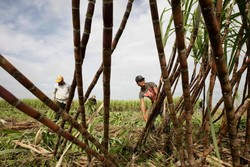
EU, Government Still at Odds Over Sugar Farm Compensation
By Zsombor Peter and Phorn Bopha
The government and the European Union remained at odds last week over how to compensate families that have lost land to the country’s controversial sugar plantations, even over how many families should be compensated, and seemed to move closer to agreement on the need for an outside party to mediate.
Sugar imports were also scheduled to be discussed at bilateral talks on E.U.-Cambodia relations that started in Brussels on Monday.
The March 5 meeting in Phnom Penh between Commerce Minister Sun Chanthol and E.U. Ambassador Jean-Francois Cautain was aimed at finding a lasting solution for the thousands of families who have lost land to plantations which have exported sugar to the European market duty free since 2010.
The Commerce Ministry raised the possibility of bringing in a third party to evaluate the compensation process for affected families at the second meeting of the ad-hoc committee last month. After their meeting last week, the ministry said much of the discussion focused on setting the parameters for just what that third party would ultimately do as a mediator.
“There is awareness amongst the participants that there are discrepancies in the numbers and types of claims that remain to be resolved,” the ministry said in a statement.
“Participants engaged in an extensive discussion on the scope and methodology of a possible external assessment before defining a possible remedial action.”
Commerce Ministry spokesman Ken Rathar said the committee had not yet started searching for a third party and would not say what figures either the government or the E.U. offered on how many claims might have to be settled.
“We exchanged ideas but we have not yet reached any agreement on how to help,” said Mr. Rathar, adding that the committee would probably meet again some time next month.
In a statement, Mr. Cautain said the two sides “explored the best way to deal with the data coming from the government and from the civil society,” but declined to elaborate on the data or which “civil society” groups were involved.
“The discussion will continue at the next meeting,” he said.
According to the NGOs that have followed the land disputes between the sugar plantations and local communities over the years, the plantations have allegedly grabbed the land of at least 3,500 families—and probably many more—in the provinces of Koh Kong, Kompong Speu and Oddar Meanchey. Some of the plantations are also accused of illegal evictions, poisoning local water supplies and shooting livestock.
The E.U. imported 65,000 tons of sugar worth $53 million from Cambodia in 2013, according to preliminary figures from the E.U.
Human rights groups and members of the European Parliament have called for a suspension of the free trade benefits to Cambodia, but the European trade commissioner has so far refused to even investigate the allegations.
The settlement the E.U. ambassador is now trying to hammer out with the Cambodian government appears to be a compromise.













